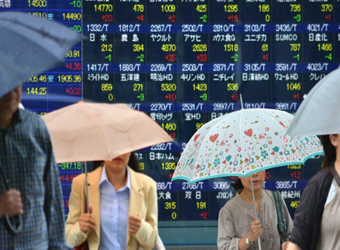Asian markets traded mixed on Wednesday after most indexes in the region recorded significant gains in the last session. Meanwhile, the dollar continued its decline against a basket of other currencies.
The Nikkei 225 slid 0.76 percent one day after the index hit a fresh 26-year high. The decline came as the dollar continued its fall against the yen. Major automakers, financials and manufacturing companies recorded declines, but some retailers clung to moderate gains. Fast Retailing, however, declined 0.75 percent.
Major tech names were also broadly lower: Nikon fell 1.36 percent and Sony tumbled 4.75 percent.
Data released Wednesday showed the country’s exports increased 9.3 percent last month when compared to one year ago, Reuters said. While that was below the 10.1 percent forecast in a Reuters poll, the value of Japan’s December exports to Asia still rose to a new record.
Over in Seoul, the benchmark Kospi index gave up early gains to trade lower by 0.04 percent. The technology sector was a mixed picture, with Samsung Electronics and SK Hynix higher by 0.57 percent and 1.26 percent, respectively. LG Electronics declined 6.39 percent.
In Sydney, the S&P/ASX 200 edged up 0.44 percent. Most sectors gained, with the exception of the materials sub-index. The country’s “Big Four” banks were mostly higher, with Westpac rising 0.39 percent.
Major mining names were broadly lower: Rio Tinto declined 0.39 percent and BHP edged down 0.36 percent. That followed the move lower in base metal prices overnight on the back of soft China demand data.
The Hang Seng Index shed 0.
25 percent after closing higher for the last six sessions. Despite the move lower on Wednesday, the index is still trading more than 9 percent higher year-to-date.
On the mainland, the Shanghai composite rose 0.13 percent, extending gains after trading at its highest levels in two years in the last session. The Shenzhen composite inched higher by 0.18 percent.
MSCI’s index of shares in Asia Pacific excluding Japan was lower by 0.2 percent at 1:11 p.m. HK/SIN.
Meanwhile, trade concerns simmered in the background after President Donald Trump approved tariffs on imported solar cells and certain washing machines earlier this week. South Korea indicated on Tuesday that it would raise the matter with the World Trade Organization.
“Outside of stepping away from the Trans-Pacific Partnership, this was the first real shift from protectionist rhetoric to actual action against China and others,” ANZ Research said in a morning note, although it acknowledged the economic impact appeared “relatively minor” for the time being.
“[T]he real question is how far the protectionist stance might start to be extended,” Richard Yetsenga, chief economist at ANZ, said in the note.
U.S. stocks closed mixed on Tuesday, with market focus shifting from politics to corporate earnings after a government shutdown came to an end on Monday.
As of last week, 79 percent of S&P 500 companies that have reported results for the fourth quarter have surpassed expectations, according to Thomson Reuters I/B/E/S.
The Dow Jones industrial average closed mostly flat at 26,210.81 while the S&P 500 and Nasdaq composite closed higher.
The dollar was broadly weaker on Wednesday ahead of an upcoming interest rates decision from the European Central Bank due Thursday during European hours.
The greenback slipped further to 109.88 against the yen, having fallen as low as 109.79 earlier. The dollar had risen as high as 111.17 on Tuesday after the Bank of Japan kept its monetary policy steady — but that rally later subsided.
The euro last traded at $1.2321, near its highest levels since December 2014. The common currency had firmed overnight following the release of upbeat euro zone consumer confidence data.
Meanwhile, the dollar index, which tracks the dollar against six major currencies sank to its lowest levels in three years. The dollar index last stood at 89.887, after falling as low as 89.588 earlier. That was below levels around the 90.4 handle seen at the beginning of the week.
On the energy front, U.S. crude traded lower by 0.03 percent at $64.45 per barrel after settling higher by 1.4 percent in the last session. Brent crude futures slipped 0.19 percent to trade at $69.83.
Shenzhen-listed HNA Investment Group announced it would suspend trade of its shares from Jan. 24 pending an announcement, Reuters said. No reason was provided for the halt.
Meanwhile, shares of Leshi Internet Information and Technology plunged 10 percent, the daily fall limit, after its shares began trading on Wednesday following a nine-month trading halt.
